| Srl | Item |
| 1 |
ID:
122150
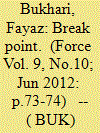

|
|
|
| 2 |
ID:
157597
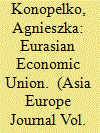

|
|
|
|
|
| Summary/Abstract |
As a top trading partner and the foreign investor in Kazakhstan, attempting to deepen bilateral relations and review its previous policy towards Kazakhstan and the post-Soviet Central Asian region (The post-Soviet Central Asian region unites five former Soviet republics: Kazakhstan, Kyrgyzstan, Tajikistan, Turkmenistan and Uzbekistan) as a whole, the European Union is facing up to a new set of internal and external conditions which affects its approach to the East. One of the crucial determinants taken into account in terms of the European Union policy towards its Kazakh partner derives from the more advanced processes of Eurasian integration created by the Russian Federation. The question is whether the EU will be able to compete or complement the consistent steps of the Russian integration project and whether the EU should move beyond a trade and investment approach and place emphasis on the other strategic areas? The main research objective concentrates on the identification and examination of the relationship between political decisions and the economic ties of Kazakhstan and its main strategic partners. Considering the current geopolitical situation in Ukraine and Central Asia, the new ‘EU-Kazakhstan Enhanced Partnership and Cooperation Agreement’ will develop more areas targeted at security and stabilization issues. However, the top-down initiatives are only the legal basis of sectorial cooperation, and the intensification of bilateral relations comes from bottom-up cooperation and people-to-people contacts.
|
|
|
|
|
|
|
|
|
|
|
|
|
|
|
|
| 3 |
ID:
157562
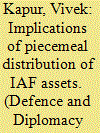

|
|
|
| 4 |
ID:
124884
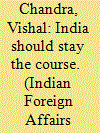

|
|
|
|
|
| Publication |
2013.
|
| Summary/Abstract |
As the Afghan war is far from over, India must take a long-term view of developments in its turbulent north-western neighbourhood. Based on certain assumptions about the likely course of the Afghan war, it is often argued that India may soon have to revisit its policies and priorities in Afghanistan. However, given the constraints and prevailing uncertainty, India may not be in a position to bring about any radical shift in its Afghan policy, at least not in the short-term. The Afghan situation is extremely fragile at the moment in view of the fragmented nature of its polity, overlapping transitions, and strong external dimensions to the conflict, all of which do have a direct impact on India's security and, at the same time, restrict its options.
|
|
|
|
|
|
|
|
|
|
|
|
|
|
|
|
| 5 |
ID:
157564
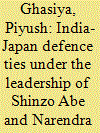

|
|
|
| 6 |
ID:
147283
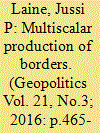

|
|
|
|
|
| Summary/Abstract |
The present geopolitical situation has made the debate on borders and their functions, significance, and symbolism more prominent than at any time since the end of the Cold War. While the various processes of globalisation have challenged the traditional border concept, the scalar model of identity and society remains primarily anchored in national space. The understanding of the state as a multiscalar construction, constantly negotiated and reconfigured by its actors at different levels, allows us to broaden the scope of our analysis and rethink and transform the spatial formations previously taken for granted in assessing the impacts of globalisation more regionally. State borders continue to have considerable relevance today, yet as the articles brought together in this special section will demonstrate, borders must be understood as complex, multiscalar, multidimensional, yet dynamic entities that have different symbolic and material forms, functions, and locations. With examples from Europe, Southeast Asia and the global south, this section aims to advance our knowledge of the multiscalar dynamics of border politics.
|
|
|
|
|
|
|
|
|
|
|
|
|
|
|
|
| 7 |
ID:
091782
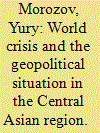

|
|
|
|
|
| Publication |
2009.
|
| Summary/Abstract |
On April 8, 2009, a "round-table" discussion on the subject - development trends of the Situation in central asia and topical Problems of the development Strategy of the Sco in the Present conditions - took place at the Institute for Far Eastern Studies. The discussion was timed to the SCO summit in Yekaterinburg in June.
|
|
|
|
|
|
|
|
|
|
|
|
|
|
|
|